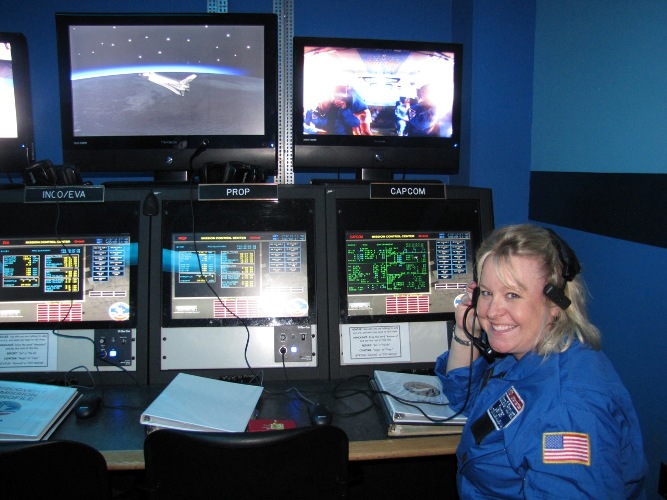
HUNTSVILLE, ALA. — Full of excitement and anticipation, 2011 Florida Department of Education Teacher of the Year Cheryl Conley and her son, Matthew, climbed aboard a plane bound for the 22nd Annual International Space Camp.
“It was an honor to represent the state of Florida while interacting with and learning from amazing teachers and NASA employees,” Conley said.
Sponsored by Toyota, NASA Marshall Space Flight Center and the Council of Chief State School Officers, International Space Camp started with a grand march with each teacher in costume to represent his or her state or country.
A total of 68 teachers comprised of 50 states, 3 territories, and 15 countries attended the camp from July 22 to July 29. Participating international teachers came from Austria, Australia, Switzerland, Dutch-Netherlands, Portugal, Greece, China, Singapore, Turkey, Latvia, Norway, Brazil and Hungary.
Among the hundreds of campers that attended space camp that same week was Conley’s 10-year-old son, Matthew, who will be entering 5th grade in August at Citrus Elementary School.
“When I found out that state teachers would receive a discount for their children if they attended camp, I knew that Matthew would jump at the opportunity to go,” Conley said.
This was Matthew’s first time away from home by himself, almost 750 miles away from Vero Beach. Both Conley and her husband, Brett, knew that it would be hard for him to be away from the family.
Bbut Space Camp is the perfect opportunity for your child to have fun, work hard and find their wings,” she said.
While participating in the Space and Aviation track, Matthew worked with his team to launch and land a shuttle mission, “flew” an F-18 Hornet and F-14 Tomcat, and built and launched model rockets.
He also learned to survive in the wild, escaped a simulated helicopter crash and trained like a real astronaut in simulated trainers.
But, most of all, he learned the value of teamwork. His team included children from China, Norway, New Jersey, Alabama, and other states across the country.
Conley also worked with teachers from around the world. The 68 US and International teacher participants were assigned to one of four teams: Harmony, Kibo, Unity and Conley’s team, Destiny, each named after a component of the International Space Station.
“It was a grueling schedule,” Conley said. “We started at seven in the morning and did not stop until nine at night. We were all exhausted, but gave each other encouragement and support.”
The teachers’ activities included simulated helicopter crashes into water, helicopter rescue, a zip line parachute simulation, and classroom activities.
Engineers from the original Apollo mission to the moon, astronauts, public relations specialists and summer staff all spoke about the various aspects of the American presence in space and conducted activities related to those missions.
Conley took command of the space station on their Atlantis mission and then worked in Mission Control as the Capsule Communicator, known as CapCom, on the Discovery mission.
“Although our missions were only two hours long, it truly gave you a sense of how critical each person’s part is during the missions,” Conley said. ” You have human lives in the orbiter counting on you to bring them home. That’s a big responsibility and it demonstrates how important it is to work together as a team. Working as a team is something that teachers know a lot about and do every day when teaching. I think that’s why our missions were such a success.”
Conley’s favorite lesson was building thermal protective devices while learning about heat transfer and re-entry to Earth’s atmosphere.
“Throughout each lesson I was constantly thinking, ‘How can I incorporate this into my classroom?'” Conley said.
Conley, who was a fourth grade teacher at Osceola Magnet School will return as an Instructional Coach in the fall. She plans to encourage teachers to think outside of the box when it is time to learn about space.
“After what I learned at camp this week, there is so much more that students can create and learn about space exploration,” she said. “There are many hands-on activities that can inspire our students to reach for the stars, both literally and figuratively.”
“Although the shuttle missions have come to an end, our students’ love and curiosity for space should never die,” she added. “As teachers, we need to keep this light alive in order to continue space exploration in future years.”
The teachers were also treated to several surprises throughout the week. Bob Springer, astronaut on both Discovery and Atlantis missions, spoke to the teachers about his experiences as an astronaut. They also heard from Ed Buckbee, former NASA employee and founder of the Space and Rocket Center and Homer Hickam, author of Rocket Boys.
“The highlight for me,” Conley said, “was when Matthew and I were flying home. As we were landing, Matthew looked at me and said, ‘Mom, our landing gear has just lowered, next the pilots will manipulate the wing flaps followed lastly with the reverse thrusters.’ I was at a loss for words. Immediately, I knew that we had made the right decision in sending him. We both have memories that will last a lifetime.”



